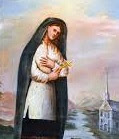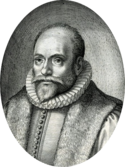By Joseph Loconte
Martin Luther was an unlikely revolutionary for human freedom. When the Augustinian monk hammered his “Ninety-Five Theses” to the Wittenberg Castle Church on Oct. 31, 1517—and unleashed the Protestant Reformation—he was still committed to the spiritual authority of the Catholic Church and retained many of the prejudices of European Christianity.
Yet Luther’s personal experience of God’s love and mercy—“I felt myself to be reborn”—supported a democratic approach to religious belief. In his theological works, Luther introduced a radical egalitarianism that helped lay the foundation for modern democracy and human rights.
Born into a German peasant family in 1483, Luther came to despise every form of spiritual elitism. He sought to replace rigid church hierarchies with “the priesthood of all believers,” the proposition that there are no qualitative differences between clergy and laity. “Just because we are all priests of equal standing,” he wrote in “An Open Letter to the Christian Nobility” (1520), “no one must push himself forward and, without the consent and choice of the rest, presume to do that which we all have equal authority.”
It was a message at odds with the vast superstructure of 16th-century Christendom. Only the monastic orders, with their vows of celibacy and poverty, could produce the spiritual athletes of the church, the thinking went. But to Luther the monasteries were hotbeds of avarice and pride. He wanted them abolished, writing in “The Babylonian Captivity of the Church” (1520) that “pretentious lives, lived under vows are more hostile to faith than anything else can be.”
Luther applied the same logic to the doctrine of Christian vocation. Resisting the stark divisions between “secular” and “religious” occupations, he dignified all legitimate work. “A shoemaker, a smith, a farmer, each has his manual occupation and work; and, yet, at the same time, all are eligible to act as priests and bishops,” he wrote.
Luther took an ax to the legal culture that shielded priests and bishops from criminal prosecution simply because they held church offices. “It is intolerable that in canon law, the freedom, person, and goods of the clergy should be given this exemption, as if the laymen were not exactly as spiritual, and as good Christians, as they, or did not equally belong to the church.” Here was a religious basis for the principle of equal justice under the law, a core tenet of liberal democracy.
Perhaps Luther’s most subversive act was his translation of the New Testament into German, a feat scholars estimate he accomplished in three months. The papacy had controlled the interpretation of Scripture, available almost exclusively in Latin, the language of the clergy and the highly educated. But Luther wanted the Bible translated and read as widely as possible: “We must inquire about this of the mother in the home, the children on the street, the common man in the marketplace,” he explained in “On Translation: An Open Letter” (1530). “We must be guided by their language, the way they speak, and do our translating accordingly.”
Luther always elevated the individual believer, armed with the Bible, above any earthly authority. This was the heart of his defiance at the Diet of Worms: “My conscience is captive to the Word of God. I cannot and I will not recant anything, for to go against conscience is neither right nor safe. Here I stand.” Neither prince nor pope could invade the sanctuary of his conscience. This, he proclaimed, is the “inestimable power and liberty” belonging to every Christian.
It would be hard to imagine a more radical break with centuries of church teaching and tradition. Luther’s intense study of the Bible—part of his anguished quest to be reconciled to God—made these great innovations possible. Convinced that the teachings of Christ had become twisted into an “unbearable bondage of human works and laws,” he preached a gospel of freedom. Salvation, he taught, was a gift from God available to everyone through faith in Jesus and his sacrificial death.
In 1520, some three years after publishing his theses, Luther released “On the Freedom of a Christian,” his manifesto on the privileges and obligations of every believer. It became a publishing phenomenon. “A Christian has no need of any work or law in order to be saved,” he insisted, “since through faith he is free from every law and does everything out of pure liberty and freely.” Christian liberty of this kind provided no excuse for libertinism. Just the opposite: “I will therefore give myself as a Christ to my neighbor, just as Christ offered himself to me.”
Luther offered more than a theory of individual empowerment. He delivered a spiritual bill of rights. Generations of reformers—from John Locke to Martin Luther King Jr.—would praise his achievement. Half a millennium later, his message of freedom has not lost its power.
 The novel "The Lyra & the Cross"
The novel "The Lyra & the Cross"









